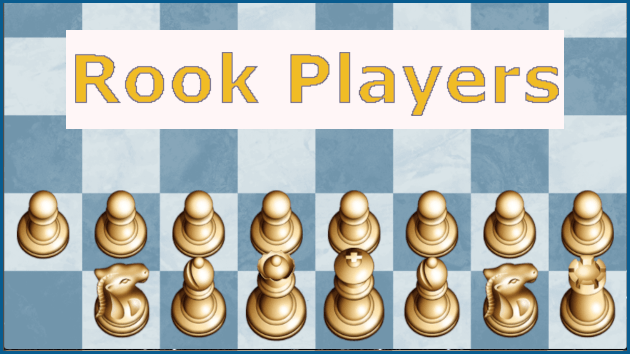
Rook Players
 The Oxford Companion to Chess, 1984. Hooper, Wyld eds.
The Oxford Companion to Chess, 1984. Hooper, Wyld eds.
The idea of classifying players by the handicap offered them by master class players was first recorded by Pietro Carrera in 1617 (Il Gioco degli Scacchi). Since there was no possibility for creating any sort of objective rating system, this method was used informally throughout the 19th century (and perhaps earlier, but there's no real documentation).
I was originally hoping to write something profound and special about "rook players." In fact I started this little essay back in November of last year but after some interesting conversations with the extremely gracious GM Larry Kaufman in April of this year during which I learned a little about what I didn't know and a lot about how much I didn't know, I shelved the whole project.
But I had amassed a goodly number of games played at Rook-odds —from books, periodicals as well as databases— that were confined to my files and yearning to fly free.
So without profundity, insight, or clever wordplay I want to simply relate (mostly quote verbatim) some of our conversations regarding Rook-odds —in an amateur vs master scenario— followed by a partial display from my trove of Rook-odds games (i.e. those I've actually digitized from the printed texts).
While I forget the original reason for our meeting, in the course of things I mentioned I had been researching Rook-odds games :
batgirl: Right now I'm working on a little article on Rook odds. What drove me to that was a line I read published by Duncan Forbes in his "Origins of Chess" from a translation of an Arabic MS by the Royal Asiatic Society which divided chess players into 5 levels and the giving of odds into 13 degrees. Giving the Rook is the 13th degree and "to give any odds beyond the Rook can apply only to women, children, and tyros. For instance, a man to whom even a first-class player can afford to give the odds of a Rook and Knight has no claim to be ranked among Chess-players."
. . .
In examining published games (I assume games of interest, rather than the ton of blundering games) I was surprised to find the weaker players weren't as bad as I expected and indeed put up decent fights. My favorite rook-odds games were those I found from one of my favorite players, Alexander M'Donnell (who lost to Labourdonnais), considered the strongest heavy odds-giver pre-Morphy.
Here's one of his games against an amateur I digitized (a very intriguing game, starting off a Rook down, M'Donnell plays the Muzio, giving away a Knight, then sacs his Bishop in a double Muzio):
His opponent put up a valiant fight, at least according to his level of skill and M'Donnell finished him off with great panache.
GM Kaufman: I have plenty of experience with rook handicap myself. If we are talking about "rapid" (as opposed to blitz or tournament TC games) games (maybe 10' +5" inc per player), I would estimate that if you are 1600 level (as I think you said), we would be an even match at rook handicap. I don't think chess.com supports this, otherwise we could try it for your article! I can give rook and knight odds to players around 1200, roughly the average chess.com member, so I certainly don't agree with the statement that such players are not to be ranked among chess players! Feel free to quote me. That's why I suspect that the reference may be to the old form of chess, where the rook is the strongest piece. We haven't had any official games with Komodo giving rook odds, but it can give knight odds successfully to 2200 level masters and so probably rook odds to 1900 or so.
One point I'm sure you'll address regarding rook odds is the debate over p on a2 or a3. It seems that the a3 thing came after Morphy's time. It's not a huge difference, but it definitely helps White somewhat to have the pawn on a3. Some standard defenses to 1.e4 don't work for Black with the pawn there.
batgirl: I'm really not into the technical side of odds-giving, i.e. the strategies or peculiarities. But speaking of a3, here is a most peculiar game played by M'Donnell at Rook odds (he plays a3). M'Donnell never studied openings -which is one reason he lost to Labourdonnais. In this game- which he lost, btw, he seems to be experimenting. (one thing that struck me is that Black seems far better developed with a better position throughout most of the game- lack of development is something one seldom sees in a M'Donnell game.)
One question based on an observation I have about Rook-odds is that, at least in old games where there is a great disparity in skill, the lack of a Rook seldom seems to matter as the odds-giver generally marshals his troops harmoniously and with tempo as opposed to his opponents who often don't even get their pieces off the back rank, making the existence or lack of the Rook somewhat moot. Since these games are fast moving, is it possible that the slow-to-get-into-play Rook might actually be less valuable to the odds-giver than the more maneuverable Knight - against weaker players that is?
GM Kaufman: As for rook vs knight odds, if the odds receiver doesn't know to develop his pieces and doesn't know to avoid murky gambits, then it's not clear. But if we assume the odds giver is a modern master (or near-master, or computer), and the receiver is strong enough to have a chance at those odds, then rook odds is considerably more than knight odds. With knight odds the giver just needs to pick up a pawn or two to have chances to draw even in an endgame, but with rook odds pretty much all endgames are lost. For a 1600 player like I think you said you are, I'm sure that you would develop your pieces and might well beat me or another master at rook odds, but probably not at knight odds, based on my experience.
By the way, I don't suppose you came across any reference to which master first introduced the idea of playing rook odds with the pawn on a3? It would be nice to call this "Mr. x's rook odds" if we had a name.
batgirl: While trying to look into the a3 vs a2 set-up for Rook odds, I tripped over some interesting things along my circuitous path. First, I found a conversation I had with some people on chessgames.com concerning this very subject back in 2007. One thing I wrote was: "I've read somewhere, possibly "The Chess Player's Handbook" by Staunton, that the additional displacement of the "a" pawn (onto a3 or a6) is customarily optional at the discretion of the giver (when giving R odds) unless otherwise contracted." There was a game I was thinking of in connection to that statement, but I couldn't recall where I found the information... or the game.
So I went back through "The Chess Player's Handbook" and found nothing. Still convinced Staunton had something to do with it, I looked through "The Chess Player's Chronicles" and especially the "Chess Player's Companion" hoping to find a clue for anything on the subject. Since, of course, they don't use the term "a3" but many, many variations of "Queen's Rook Pawn Third," it's very hard to search. And, sure enough, I never found anything.
I did come across a reference to few Queen's Rook odds games played by Aron Nimzowitsch in 1919 with the Rook pawn on a3 and/or a6, but I didn't have access to the game scores themselves. Then I found some games given by Siegbert Tarrasch in his book, "Dreihundert Schachpartien : e. Lehrbuch d. Schachspiels für geübte Spieler."
Here are two of them:
Finally, I found what I was looking for. It wasn't the quote, but the game and it wasn't Staunton after all, but Ludwig Bledow in Bisguier's "Handbuch des Schachspiels" 1843 (p.375)
Here the actual score from the "Handbuch" because it shows white having two first moves (a3 followed by e4). This indicates to me that Rook-odds with the pawn on a3/a6 is less odds than simply the Rook. White removes his Rook but in return he gets two first moves (one of which is of course dictated).
I also came across this quote. In a long series of articles entitled, "A Sketch of Chess History Before the Second Revolution" in the "BMC" in 1900, William Shelley Branch wrote:
"It was much more difficult to give the odds of Rook or Knight than it is now [comparing modern chess to Shatranj]. Giving a Rook was nearly as much to the old-time player as to give "the Queen" would be to my present reader."
I was digitizing yet another M'Donnell Rook-odds game when I found that on move 18, White (the odds-giver) played 0-0-0. i.e. he castled with no existing Rook . Besides being impossible (as far as I know) to express this in a pgn, it brings up the question concerning the modern treatment of casting when the Rook is missing. I don't know if there is any standardization concerning odds-games. Does FIDE even involve itself in "variants?" It seems to me there should be some acceptable authoritative entity.
Going back through old texts, I found Major Jaenisch opposed the ability to castle because there is no Rook with which to castle. Staunton argued that since the Rook wasn't captured and never moved, punishing the odd-giver for not having the Rook was wrong and one should be allowed to castle, following the remaining rules, as if the Rook existed.
Here's M'Donnell's 0-0-0 game (in 2 parts):
GM Kaufman: Regarding castling with a missing rook, it's moot now since none of the engines or databases or GUIs support it, so it's only a historical point.
batgirl: Are you saying that OTB odds-games are dictated by digital support... or just that computer vs human games are?
It just struck me as interesting that we possibly have obverse/reverse perspectives - you approach this from a computer POV and I from anything-but-a-computer POV.
GM Kaufman: Yes to question about special castling rule for rook odds being too much work for too little use. Sure, if lots of rook odds games were played with everyone insisting on this rule it could be done, but since there is no universal agreement on this it makes more sense to stick to normal rules of chess which don't require special notation, special GUIs, etc.
batgirl: I started off with an idea of writing a piece on Rook-odds - and I collected a lot of data and games, mostly of historic, rather than practical value towards that goal. Thanks to you, I'm realizing I'm not at a point where I know enough to do the subject justice. So, now I'm collecting my thoughts and re-evaluating things.
one might also like to read:
"Teaching Chess with Handicaps" by IM Larry Kaufman "Chess Life" Jan./Feb/ 2001
"The Return of Handicap Chess" by GM Larry Kaufman "Chess Life" April 2016
Some Master vs Rook-Player games:
Paul Morphy was known for his odd-giving ability since his childhood. . . when these Rook-odds games were played (Morphy was born in 1837).
The last five games are examples of the chess play of George Hammond of the Boston Chess Club. He succeeded Benjamin Lynde Oliver as the New England Chess Champion around 1843 and held that title for decades. When Morphy played Hammond in Boston, Hammond won 1 of their 8 games. Objectively, the games aren't of master quality but they do have their sparkly moments.
All the following games came from the "Illustrated American," 1891.






